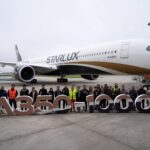From the third quarter of 2022, all Singapore Airlines flights will use Sustainable Aviation Fuel (SAF) as part of a new one-year pilot. 1.25 million litres of undiluted SAF, produced from used cooking oils and waste animal fats, will be supplied by Neste and then mixed with refined Jet Fuel by ExxonMobil, who will be providing Singapore Airlines with the final product.

The Chairman and Managing Director of ExxonMobil, Ms Geraldine Chin, said
“Our well-established infrastructure and logistics capabilities allow us to supply jet fuel blended with Neste’s sustainable aviation fuel at Changi Airport. We are leveraging our resources, technology and capabilities to deliver more renewable fuels to help customers reduce their emissions.”
History of SAF
KLM flew the first commercial flight to use SAF in 2011. To date, more than 150,000 flights have been powered by SAF. Other airlines that have recently committed to using SAF include Turkish Airlines and Virgin Atlantic.

The Pilot
2,500 tonnes of carbon dioxide emissions are expected to reduce using SAF during the one-year pilot. The Senior Vice President of Corporate Planning at Singapore Airlines, Ms Lee Wen Fen, stated
“Sustainable aviation fuels are a key decarbonisation lever, and a critical pathway for the success of the SIA Group’s commitment to achieve net zero carbon emissions by 2050. This pilot reinforces our commitment towards decarbonisation and sustainability across our operations. By collaborating with our partners, we can accelerate and scale up the adoption of sustainable aviation fuels in Singapore.”
Mr. Frederick Teo, who is the Managing Director of Temasek, a global investment company involved with the project, explained,
“The SAF pilot marks an important step in our commitment to operationalise solutions to decarbonise hard-to-abate sectors like aviation. We look forward to learning useful operational lessons from the pilot, and working closely with our partners to advance the frontiers of sustainable aviation through impactful industry-wide decarbonisation strategies.”
The SAF can be utilised straight away without the need to make changes to the existing infrastructure, and by the end of July 2022, they plan to deliver the SAF via Changi Airport’s current fuel hydrant system. The Executive Vice President of Airport Management at Changi Airport Group, Mr Tan Lye Teck, stated
“Changi Airport Group is committed to advancing Changi as a sustainable air hub by supporting green initiatives. We will work with airlines, industry players and government agencies to accelerate the adoption of SAF at Changi Airport, to power more sustainable air travel.”
Which airline do you think will be next to commit to using Sustainable Aviation Fuel? Let us know in the comments below!









